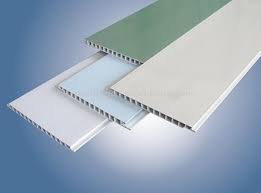
Polyvinyl-Chloride (PVC) is a plastic product which has matchless versatility. It effectively replaces wood, paper and metal in several applications. As such plastic pipes have been progressively replacing conventional pipes like G.I., Cast Iron, Asbestos Cement or Stone-ware for a number of important and uses.
Polyvinyl-Chloride (PVC) can be made into ceiling panels. Polyvinyl-Chloride (PVC) waterproof ceiling panels are an ideal ceiling cladding solution when renovating or finishing ceilings.
Decorative polyvinyl chloride (PVC) panels have gained immense traction over the recent past, as one of the most beneficial and affordable materials for installing on ceilings.
Greater reliability, termite resistance, and longer lifespan are key attributes of polyvinyl chloride (PVC) ceiling panels that have propelled their demand in the construction sector.
Available in a broad range of colors and patterns, polyvinyl chloride (PVC) ceiling panels are robust, lightweight, and facilitate handling and installation, devoid of the requirement for special tools.
As easy-to-maintain polyvinyl chloride (PVC) ceiling panels require lesser human resources, the overall cost of the product is remarkably reduced, thereby resulting into higher demand.
In addition, polyvinyl chloride (PVC) panels complement ideal overall temperature of residential or commercial spaces, which in turn enhances efficiency of air conditioners. Fire resistance property of the one hundred percent (100%) anti-mold polyvinyl chloride (PVC) panels has made them increasingly preferable for ceilings and walls of commercial buildings.
According to a new report from German market research institute Ceresana, global demand for polyvinyl chloride (PVC) is set to increase by around three point two percent (3.2%) per year until 2021.
Worldwide consumption of polyvinyl chloride (PVC) was estimated at 39.3 million tonnes in 2013. Polyvinyl chloride (PVC) is one of the most widely produced plastics, alongside polypropylene and polyethylene, and its use requires significant volumes of polymer additives.
The ceiling tiles market is projected to reach USD 9.88 Billion by 2022, at a compound annual growth rate (CAGR) of six point two percent (6.2%) between 2017 and 2022
Ceiling tiles, also known as ceiling panels, refer to lightweight construction materials which are used to enhance the overall aesthetics of a room or space. They can be utilized for numerous ceiling types which include shed, tray, coved, domed, vaulted, decorative, cathedral and suspended.
They are manufactured from materials like clay, metal, gypsum, recycled paper and natural starch. Some of the advantages associated with these tiles include durability, low-maintenance, fire-resistance, thermal insulation, absorption of sound and reflection of natural light.
As a result, they are widely used in the construction and renovation of offices, schools, cafeterias, hospitals, stores, hotels and airports.
Driven by the revival of the construction industry, both the developed and developing regions are witnessing an increase in the construction of residential, commercial and industrial buildings which, in turn, is strengthening the growth of the ceiling tiles market. Apart from this, due to the growing western influence, consumers are now seeking affordable false ceiling options that offer stylish and luxurious interiors.
Further, technological advancements have also enabled manufacturers to simplify the installation process which guarantees perfect alignment as well as optimum finished look to end-consumers. On account of these factors, IMARC Group estimates that the market for ceiling tiles will reach a value of around US$ 35 Billion by 2025, at a compound annual growth rate (CAGR) of six point two percent (6.2%) during the forecast period (2020-2025).
Polyvinyl-Chloride (PVC) ceiling panels are extensively used in the real estate / construction industry in Nigeria. The demand for polyvinyl-Chloride (PVC) ceiling panels in Nigeria has been identified to continue to expand as the standard of living of the over two hundred million (200,000,000) population growing at the rate of five point seven percent (5.7%) per annum continues to grow.
From the above figures, it is clear that there is a large and sustainable market for polyvinyl-Chloride (PVC) ceiling panels in Nigeria.























